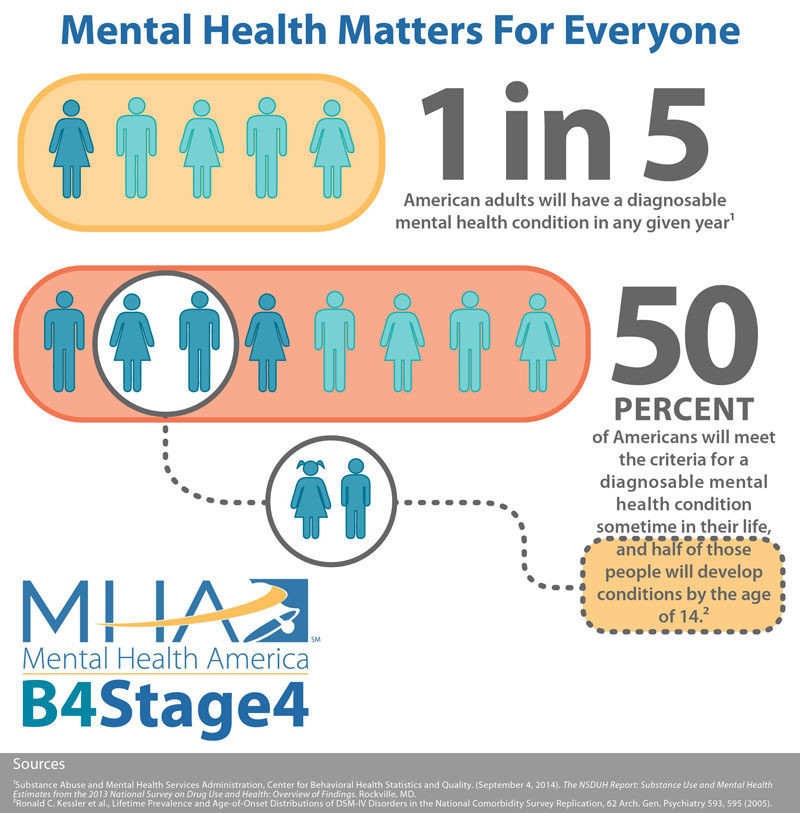 One of the primary services provided by The Wellness Coalition is wellness case management (WCM). WCM is a service that can help those with chronic conditions find a doctor and link them with medications and other services. As part of this initiative, we work to understand causes associated with the development of chronic diseases in the people that we help. Mental health is often part of the equation.
One of the primary services provided by The Wellness Coalition is wellness case management (WCM). WCM is a service that can help those with chronic conditions find a doctor and link them with medications and other services. As part of this initiative, we work to understand causes associated with the development of chronic diseases in the people that we help. Mental health is often part of the equation.
World Mental Health Day is marked every year on October 10 to raise awareness about mental health around the world and to mobilize efforts to support those experiencing mental health issues. The Wellness Coalition is marking this important observance by sharing information about mental health and its association with chronic disease, as well as helpful information about mental health as a whole.
What Is Mental Health
Mental health includes our emotional, psychological, and social well-being. It affects how we think, feel, and act. It also helps determine how we handle tress, relate to others, and make healthy choices. Mental health is important at every stage of life, from childhood and adolescence through adulthood.
Although the terms are often used interchangeably, poor mental health and mental illness are not the same. A person can experience poor mental health and not be diagnosed with a mental illness. Likewise, a person diagnosed with a mental illness can experience periods of physical, mental, and social well-being.
Why Is Mental Health Important for Overall Health
Mental and physical health are equally important components of overall health. For example, depression increases the risk for many types of physical health problems, particularly long-lasting conditions like diabetes, heart disease, and stroke. Similarly, the presence of chronic conditions can increase the risk for mental illness.
Can Your Mental Health Change Over Time?
Yes, it’s important to remember that a person’s mental health can change over time, depending on many factors. When the demands placed on a person exceed their resources and coping abilities, their mental health could be impacted. For example, if someone is working long hours, caring for a relative, or experiencing economic hardship, they may experience poor mental health.
What Causes Mental Illness
There is no single cause for mental illness. A number of factors can contribute to risk for mental illness, such as:
- Early adverse life experiences, such as trauma or a history of abuse (for example, child abuse, sexual assault, witnessing violence, etc.)
- Experiences related to other ongoing (chronic) medical conditions, such as cancer or diabetes
- Biological factors or chemical imbalances in the brain
- Use of alcohol or drugs
- Having feelings of loneliness or isolation
How Common Is Mental Illness
Mental illnesses are among the most common health conditions in the United States.
- More than 50% will be diagnosed with a mental illness or disorder at some point in their lifetime.
- 1 in 5 Americans will experience a mental illness in a given year.
- 1 in 5 children, either currently or at some point during their life, have had a seriously debilitating mental illness.
- 1 in 25 Americans lives with a serious mental illness, such as schizophrenia, bipolar disorder, or major depression.
Sources of Support
Mental Health America in Montgomery advises that a person should seek professional help when something disrupts their life daily and continues for a couple of weeks or longer. This may include thoughts of harming themselves or others. Sources of support include:
211
211 helps you to gain access to all
community resources.
- Dial 2-1-1 or text 888-421-1266.
- Chat online at 211connetsalabama.org.
Connect Alabama App
Behavioral health services and treatment finder that provides individuals with access to education, information, and services related to substance abuse, mental health, and prevention. The app is available for download on iOS through the App Store and for Android devices via Google Play.
Mental Health America
Find educational resources and self-screen for a variety of mental and emotional wellness conditions at mhanational.org
National Alliance on Mental Illness
- nami.org and namialabama.org
- Call the helpline at 1-800-950-6264 or text “helpline” to 62640
- Alabama Crisis Line: 1-800-273-8255
Wings Across Alabama
Staffed by Certified Peer Specialists who have personal experience with mental illness, including stigma, feeling overwhelmed, loneliness, thoughts of suicide, challenges of poverty, and more. Call to have a confidential conversation with someone who will listen without judgment or criticism.
- 1-844-999-4647
- wingsacrossal.org
